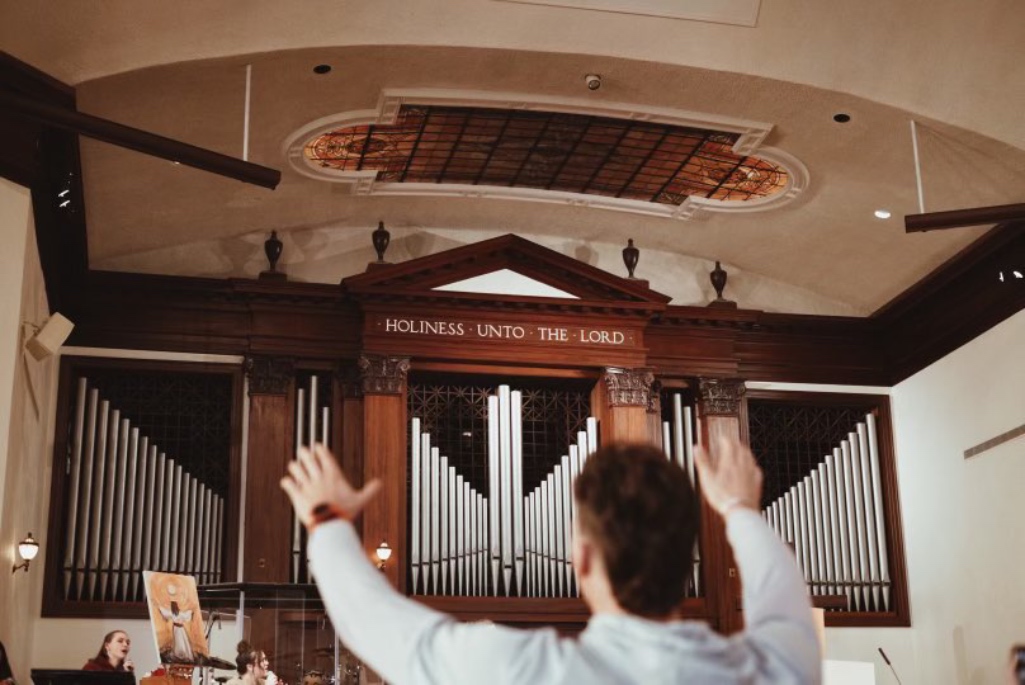
A man worships during a revival meeting at Asbury University and Theological Seminary.
WILMORE, Ky. — Asbury University counts the current Holy Ghost revival, now surpassing a week, among eight spontaneous spiritual outbreaks at the small Wesleyan-Holiness campus since 1905, including the 1970s revival that spread nationally.
No such continuous revival is counted as having been birthed among the six Southern Baptist seminaries and the numerous undergraduate colleges supported with Southern Baptist dollars.
Is there anything in Southern Baptist theology, practice or culture that discourages the birth of such movements?
Both Tim Beougher and Bill Elliff, longtime students of revival who’ve attended and written about the Asbury event, shared their thoughts with Baptist Press. Both see components within and external to Southern Baptist life that tend to hinder revival.
Beougher, the Billy Graham professor of evangelism and church growth at Southern Baptist Theological Seminary, has studied revivals for more than 40 years.
Beougher references the late evangelist Roy J. Fish, who said Baptists fear revival because of a fear of excess.
“We see people that we think put too much of an emphasis on the Holy Spirit, so we drive off the ditch on the other side and pretend there isn’t even a Holy Spirit,” Beougher paraphrased Fish, “where we don’t even mention Him.
“He said we have become so afraid of strange fire, that we would rather remain cold than open ourselves to be warmed by the fire of God.”
While Southern Baptists and Wesleyan-Holiness believers have doctrinal distinctions, Beougher doesn’t believe that’s the reason Asbury attracts so much revival.
“We definitely have doctrinal distinctions related to baptism and church government,” he told Baptist Press. “Wesleyan-Arminians believe you could lose your salvation. Some of them believe you can obtain complete sanctification in this life.
“There are some theological distinctives, but I don’t know that I would attribute it as much to those theological distinctions as just, they’ve experienced this in the past,” Beougher said.
“They have a hunger to see God work and they’re crying out to Him. And I think God loves to answer those kinds of prayers.”
Elliff, directional pastor of The Summit Church in Little Rock, Ark., doesn’t see anything in Southern Baptist theology that discourages revival.
“I think we have some practical heart beliefs that hinder it,” Elliff told Baptist Press.
“Part of it is Southern Baptists have been very successful. If you’re real successful in church planting and growth, we were the largest, etc., etc.,” Elliff said, “you tend to feel you don’t need God to come in a sweeping movement of revival. I think success sometimes is our enemy in that way.”
Across America, Christians are not students of revival and awakening. Christians don’t expect the phenomena.
“The reason I’ve pursued that for the last 50 years is because I was in a moment in the Jesus Movement, in a season where I saw revival and awakening,” Elliff said. “I got the taste in my mouth so I’ve studied it all my life, read about it, experienced it, pursued it.”
Perhaps many pastors, he said, believe we can build churches based on intellect, without the work of the Holy Spirit and without prayer.
“There’s a real emphasis right now on theological correctness. I agree with that; I’m all for that,” Elliff said. “But also, I agree that we need to encounter God, experience God. It’s not just in the head. It’s in the heart. There’s more than just learning about God. Paul said I give up everything so that I might know, experientially, God.”
Both Elliff and Beougher see elements at Asbury University that encourage revival.
“It seems to me – I’m not an authority on this – it seems to me that that particular school has an openness to this, a bent towards this. They want to see God come,” Elliff told Baptist Press.
“They believe in experiential spirituality, and I do too. And I’m not talking about charismatic theology, as much as just heart theology … and heart experience. And there’s a deep emphasis on prayer, and on surrender.”
Elliff also sees a faith component in the mix at Asbury.
“They are looking for and expecting God to move because of their past,” Elliff said. “I think across the board in America, because we haven’t seen a nationwide movement since 1970, and prior to that, 1904 in the Welsh revival that dramatically affected America. Because we haven’t seen that personally, most of us, then we don’t pray big.
“We can’t fathom that 15% of the population could come to faith in two years like it did in the first great awakening. So, we don’t even ask for it.”
Beougher believes many Christians, let alone Southern Baptists, fear revival because of the change it brings.
“True revival begins in agony. It doesn’t begin with laughter; it begins with tears,” Beougher said, referencing comments from the late revivalist J. Edwin Orr. “And Orr said revival is like judgment day. The Spirit of God just shines His searchlight on our hearts and anything out of keeping with God’s Word and God’s will is exposed, and we’re forced to deal with it.
“I think that’s a big reason why people fear revival, is because they know those hidden sins are going to come to light. God’s going to shine His searchlight on it, and it’s going to mean change.”
While Beougher is not ready to call the Asbury revival the third great awakening, he said “every believer ought to be on their knees in prayer, praying for God to do something. Our churches desperately need revival. Our nation desperately needs awakening. We ought to all be crying out to God, asking Him to do something new.
“If this movement becomes a spiritual awakening, it won’t just be Christians talking about it,” Beougher said. “Everyone in America will know what’s going on, because it will be transforming our culture.”
Beougher wrote his master’s thesis on the 1970 Asbury Revival and its impact on Southwestern Baptist Theological Seminary, and co-authored with Lyle W. Dorsett, “Accounts of a Campus Revival: Wheaton College 1995.”
“Ultimately, I think we have to fall back on the sovereignty of God,” Beougher told Baptist Press. “I think G. Campbell Morgan said it well. He said, ‘We cannot cause the wind of the Spirit to blow, but we can set our sails to catch the wind when it does blow.’”
(EDITOR’S NOTE – Diana Chandler is Baptist Press’ senior writer.)


